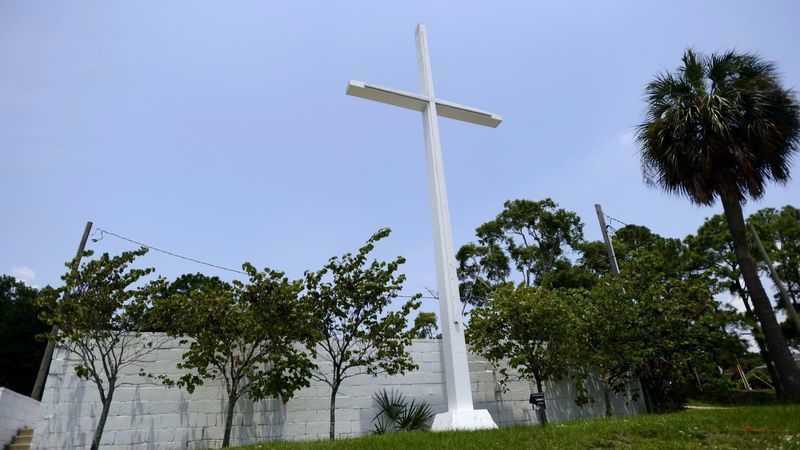
PENSACOLA, Fla. — A federal judge appointed to the bench by then-President Ronald Reagan has ruled that a 25-foot cross display in a public park in Florida is unconstitutional and must be removed.
The American Humanist Association (AHA) and the Freedom From Religion Foundation (FFRF) had sued the City of Pensacola last year on behalf of four local residents who asserted that the cross, which has been displayed at Bayview Park for over 70 years and maintained by the city, violates the separation of church and state.
The groups had written to city officials to request that the cross be removed, but their demands were rejected. Therefore, they took the matter to the courts.
“Mr. Kondrat’yev’s use and enjoyment of the local park is impeded by the Bayview Cross,” the legal complaint read, citing plaintiff Andreiy Kondrat’yev. “He feels a sense of peace and tranquility at the Bayview Park, but feels that is overshadowed by a religious symbol that signifies torture and violence to him.”
Kondrat’yev and his wife, who was also a plaintiff in the case, have since moved to Canada since becoming involved in the suit.
David Suhor, an atheist who delivered an invocation to Satan at the Pensacola city hall last year, was additionally one of the complainants in the legal challenge.
“Mr. Suhor objects to the government’s display of the Christian cross because he believes it is an endorsement of Christianity, placed primarily for religious purposes, including aggrandizing Easter Sunday services,” the filing read. “As a non-Christian, Mr. Suhor is personally offended and feels excluded by this governmental message. He opposes this appearance of governmental favoritism for religion and for a particular religion, Christianity.”
However, attorneys for the city argued in court that the cross is simply a longstanding part of Pensacola’s history and has never been construed as favoring one religion over another.
“To say that this cross is purely a religious symbol is wrong. It’s a Christian symbol, sure, but it’s used to honor those who have fallen on Veterans Day and Memorial Day,” Nixon Daniel of the law firm Beggs & Lane said. “So, from the city’s perspective, there is a secular purpose for it.”
“The city of Pensacola cannot go out today and put a cross there,” he also stated. “But the determining factor that you have to look at is this has been there for 40 years and no one has objected to it.”
During oral argument last week, U.S. District Court Judge Roger Vinson disclosed that he was a part of the Jaycee—the group the helped to place the cross years prior—in the 1970’s and served as the group’s president in 1974 and 1975. He seemed to suggest that he did not want to remove the cross, but felt he must.
“I may not agree with the law, but I still have to apply it,” he stated.
Vinson also outlined in his Monday ruling that he believes there is a difference between the original intent of the Founding Fathers regarding the Establishment Clause and the various case law that he felt bound to follow. He said that the cross would be deemed legal if viewed through the lens of what the nation’s founders intended.
“[H]ow is the Bayview Cross supposed to be analyzed? By applying [the] Lemon [standard]; one of the other tests; or no formal test at all?” he wrote. “May I look to what the Founding Fathers intended (in which case the cross is certainly constitutional), or must I look to how the ‘wall of separation’ metaphor has been applied (in which case it is probably unconstitutional)?”
“Ultimately, these are not difficult questions—legally speaking—because there is controlling precedent directly on point,” Vinson said.
The Reagan judge then pointed to the outcome of a similar case in Rabun County where a cross that was determined to be of a religious nature was found to be unconstitutional.
“If the cross under review in Rabun County violated the First Amendment and had to be removed, the cross here must suffer the same fate,” he wrote. “Indeed, not only are both of the above facts also present here (i.e., it is a Latin cross that was completed by, and dedicated at, an Easter Sunrise Service), but the mayor has said that he does not want the cross taken down specifically because he hopes there will ‘always [be] a place for religion in the public square,’ which is essentially an admission that the cross has been sustained for a religious purpose.”
Vinson said that the cross could have stayed if the land surrounding it had been sold to a non-governmental entity.
“To be clear: None of this is to say that the cross would have to come down if the City sold or leased the area surrounding it to a private party or non-governmental entity (so long as the transfer was bona fide and not a subterfuge),” he stated. “Nor would there be a constitutional problem with worshipers using a temporary cross for their services in the park (counsel for plaintiffs conceded that point during the hearing).”
However, he concluded that because of existing case law, the cross must come down and ordered it to be removed in 30 days.
“We are pleased that the Court struck down this Cross as violative of the First Amendment,” Monica Miller, senior counsel at AHA’s Appignani Humanist Legal Center, said in a statement. “The cross was totally unavoidable to park patrons, and to have citizens foot the bill for such a religious symbol is both unfair and unconstitutional.”
But area residents, as well as supporters from across the nation, are upset about the outcome and are still seeking a way to save the cross.
“Don’t let four people, of whom two now reside in Canada, decide what’s right for the City of Pensacola,” one petition being circulated reads.
The petition already has 11,000 signatures as of press time.
Become a Christian News Network Supporter...


